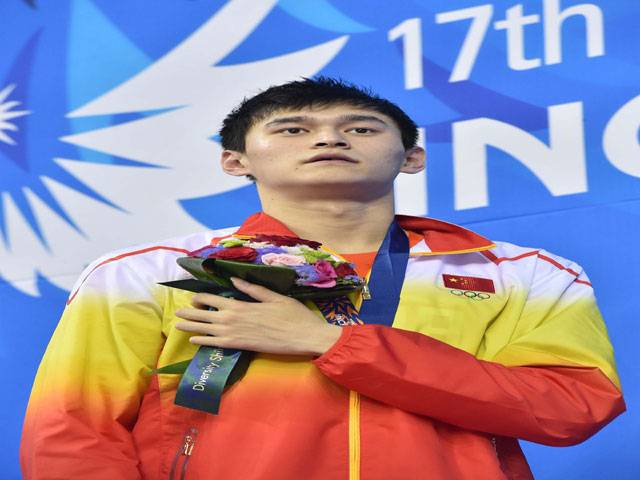BEIJING - Chinese swimming sensation Sun Yang served a three-month doping ban this season before returning to competition, officials revealed on Monday in the country's biggest drugs case in years. The double Olympic champion and 1,500 metres world record-holder, a superstar who is also known for his brushes with authority, won three gold medals at the Asian Games after serving the previously unannounced ban.
Chinese officials denied a cover-up and said the suspension was unusually short because Sun, 22, had convinced them he did not mean to take the banned stimulant trimetazidine. "I have taken many doping tests during years of training and competition and I had never failed one before," the official Xinhua news agency quoted Sun as saying. "I was shocked and depressed at that time, but at the same time it made me cherish my sporting life even more. I will take it as a lesson and be more careful in the future."
Chinese swimmers were notorious for doping in the 1990s, partly explaining the innuendo that swirled after Ye Shiwen's jaw-dropping women's 400m individual medley win at the 2012 London Olympics. Xinhua said Sun's suspension was imposed in July but backdated to May 17, when he tested positive for trimetazidine at the Chinese national championships.
He was stripped of his 1,500m national title and fined 5,000 yuan ($800). The suspension ended on August 17, a month before the Asian Games in Incheon, South Korea.
The China Anti-Doping Agency (CHINADA) said Sun, jailed briefly last year for driving offences, waived his right to have his B-sample tested after failing the initial test.
At a hearing he said the trimetazidine was in a prescription drug he sometimes takes for heart palpitations, and he did not know it had been added to the list of banned substances at the start of this year. Sun "proved with sufficient evidence that he did not intend to cheat", said Zhao Jia, deputy director of CHINADA, according to Xinhua.
Zhao said CHINADA had been too busy with other tests to announce Sun's case earlier. Six other positive cases were revealed in the agency's second and third-quarter reports, both released on Monday. "Sun is the most famous athlete in China and is known in the world, which means we need to handle his case very cautiously," he told Xinhua. "This is huge bad news but we will not cover it up."
The Olympic Council of Asia, which runs the Asian Games, said it had no plans to strip Sun of his Asiad gold medals despite also being unaware of the doping incident. "Incheon Asian Games anti-doping tests haven't shown the positive case so this has nothing to do with OCA," a spokesman told AFP via email. It was only the latest incident to embroil Sun, who has frequently battled with authority, leading to jail time and prolonged suspensions from the swimming pool.
In 2013 he was suspended from commercial activities and warned about his behaviour after a battle with his coach over a relationship with an airline stewardess. His notoriety grew in November last year when he was caught driving a relative's Porsche without a licence following a collision with a bus. He was jailed for one week and suspended from swimming for six months. At the Asian Games he courted controversy by calling the Japanese national anthem "ugly", although he later apologised.
After news of the doping test broke on Monday, Chinese swimming fans chastised Sun for his behaviour. "He is a troublesome child who won't grow up," said one posting on Weibo, China's Twitter-like microblogging service. Chinese swimming was notorious for doping in the 1990s after a stream of positive tests, culminating at the 1998 world championships in Perth.
Yuan Yuan was caught trying to smuggle human growth hormone into Australia, and four of her team-mates later tested positive for a banned masking agent. Other scandals included Ma Junren's "Ma's army" of elite runners, who were barred from the 2000 Sydney Olympics by Chinese officials over suspicious blood tests. Ma said their success at world and Olympic level boiled down to their marathon-a-day training sessions and traditional medicines containing turtle blood and caterpillar fungus.
In recent years Chinese doping cases have become infrequent, although women's hammer champion Zhang Wenxiu was thrown out of the Asian Games for taking the anabolic agent zeranol. Speculation rose over swimmer Ye at the 2012 Olympics when the then 16-year-old's world record 400m medley included a final 50m that was faster than the winner of the men's race, Ryan Lochte. Sun defended her at the time, saying: "People think China has so many gold medals because of doping and other substances, but I can tell you it is because of hard work."
Friday, April 19, 2024
China reveals drugs ban for Olympic champion Sun

Pak economy improving, funds will be provided on request: IMF
9:57 PM | April 19, 2024
Minister advocates for IT growth with public-private collaboration
9:57 PM | April 19, 2024
Judges' letter: IHC seeks suggestions from all judges
9:55 PM | April 19, 2024
Formula 1 returns to China for Round 5
9:05 PM | April 19, 2024
Germany head coach Julian Nagelsmann extends contract till 2026 World Cup
9:00 PM | April 19, 2024
A Tense Neighbourhood
April 19, 2024
Dubai Underwater
April 19, 2024
X Debate Continues
April 19, 2024
Hepatitis Challenge
April 18, 2024
IMF Predictions
April 18, 2024
Kite tragedy
April 19, 2024
Discipline dilemma
April 19, 2024
Urgent plea
April 19, 2024
Justice denied
April 18, 2024
AI dilemmas unveiled
April 18, 2024
ePaper - Nawaiwaqt
Advertisement
Nawaiwaqt Group | Copyright © 2024





